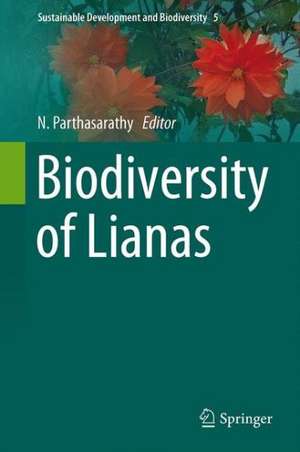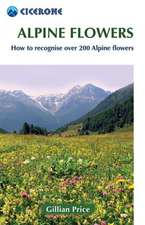Biodiversity of Lianas: Sustainable Development and Biodiversity, cartea 5
Editat de N. Parthasarathyen Limba Engleză Hardback – 4 aug 2015
Din seria Sustainable Development and Biodiversity
- 18%
 Preț: 962.18 lei
Preț: 962.18 lei - 18%
 Preț: 953.03 lei
Preț: 953.03 lei - 18%
 Preț: 952.09 lei
Preț: 952.09 lei - 18%
 Preț: 1563.72 lei
Preț: 1563.72 lei - 18%
 Preț: 1133.34 lei
Preț: 1133.34 lei - 18%
 Preț: 1219.63 lei
Preț: 1219.63 lei - 18%
 Preț: 1572.88 lei
Preț: 1572.88 lei - 24%
 Preț: 796.33 lei
Preț: 796.33 lei - 24%
 Preț: 1564.50 lei
Preț: 1564.50 lei - 18%
 Preț: 1412.20 lei
Preț: 1412.20 lei - 18%
 Preț: 1669.03 lei
Preț: 1669.03 lei - 18%
 Preț: 955.08 lei
Preț: 955.08 lei - 24%
 Preț: 824.66 lei
Preț: 824.66 lei - 24%
 Preț: 824.15 lei
Preț: 824.15 lei - 24%
 Preț: 1052.06 lei
Preț: 1052.06 lei - 24%
 Preț: 900.85 lei
Preț: 900.85 lei - 24%
 Preț: 903.56 lei
Preț: 903.56 lei - 18%
 Preț: 1391.97 lei
Preț: 1391.97 lei - 15%
 Preț: 646.11 lei
Preț: 646.11 lei - 15%
 Preț: 645.60 lei
Preț: 645.60 lei - 24%
 Preț: 794.73 lei
Preț: 794.73 lei - 15%
 Preț: 705.51 lei
Preț: 705.51 lei - 24%
 Preț: 786.67 lei
Preț: 786.67 lei - 24%
 Preț: 983.36 lei
Preț: 983.36 lei - 18%
 Preț: 1559.80 lei
Preț: 1559.80 lei - 18%
 Preț: 1398.14 lei
Preț: 1398.14 lei - 18%
 Preț: 1416.47 lei
Preț: 1416.47 lei - 18%
 Preț: 1575.88 lei
Preț: 1575.88 lei - 18%
 Preț: 1400.50 lei
Preț: 1400.50 lei - 18%
 Preț: 953.20 lei
Preț: 953.20 lei - 24%
 Preț: 820.37 lei
Preț: 820.37 lei - 20%
 Preț: 583.95 lei
Preț: 583.95 lei
Preț: 578.05 lei
Preț vechi: 722.56 lei
-20% Nou
Puncte Express: 867
Preț estimativ în valută:
110.62€ • 120.12$ • 92.92£
110.62€ • 120.12$ • 92.92£
Carte tipărită la comandă
Livrare economică 18-24 aprilie
Preluare comenzi: 021 569.72.76
Specificații
ISBN-13: 9783319145914
ISBN-10: 3319145916
Pagini: 380
Ilustrații: XI, 278 p. 30 illus., 11 illus. in color.
Dimensiuni: 155 x 235 x 19 mm
Greutate: 0.7 kg
Ediția:1st ed. 2015
Editura: Springer International Publishing
Colecția Springer
Seria Sustainable Development and Biodiversity
Locul publicării:Cham, Switzerland
ISBN-10: 3319145916
Pagini: 380
Ilustrații: XI, 278 p. 30 illus., 11 illus. in color.
Dimensiuni: 155 x 235 x 19 mm
Greutate: 0.7 kg
Ediția:1st ed. 2015
Editura: Springer International Publishing
Colecția Springer
Seria Sustainable Development and Biodiversity
Locul publicării:Cham, Switzerland
Public țintă
ResearchCuprins
Forward. - Preface. - 1. General Introduction. - 2. Patterns of liana abundance and distribution in temperate forests. - 3. Geographical, taxonomical and ecological aspects of lianas in subtropical forests of Argentina. - 4. Liana effects on carbon storage and uptake in mature and secondary tropical forests. - 5. Diversity and distribution of climbing plants in Eurasia and North Africa. - 6. Liana assemblages in tropical forests of Africa and South East Asia: diversity, abundance and management. - 7. Diversity of lianas in Eastern Himalayas and North-Eastern India. - 8. Biodiversity of lianas and their functional traits in tropical forests of peninsular India. - 9. The contribution of lianas to forest ecology, diversity, and dynamics. - 10. Liana diversity and their ecosystem services in tropical dry evergreen forest on the Coromandel Coast of India. - 11. A review of biotechnological approaches to conservation and sustainable utilization of medicinal lianas in India. - 12. Biological invasion of vines, their impacts and management. - 13. Liana diversity and the future of tropical forests. - Index
Textul de pe ultima copertă
The scope of biodiversity science is vast. The conservation of the rich biological wealth of our planet earth, sustainable use of biodiversity resources and their wiser management become crucial and challenging. On-going global changes exert their effect on biodiversity, bio-resources and their use patterns for sustainable development as to conserve them for generations to come.
The lianas or the woody climbers form one of the fascinating groups of forest plant diversity, yet remain relatively under-researched, as compared to trees. They occur in temperate, sub-tropical and tropical forests, but particularly diverse in tropical environments, and their density is exceedingly high in dry tropics. Lianas have both positive and negative contribution in forest ecology, particularly the liana load on trees reduce tree growth and enhance tree mortality. Lianas also play important positive roles in forest functioning, contribute substantially to forest aboveground biomass and render several ecosystem services (rewarding leaf, flower and fruit resources ) to various faunal communities, and provide several goods of economic importance utilized by humans (from ropes, fruits to medicine). That being the importance of lianas in forest ecosystem, it calls for greater attention in sustainable resource use and wiser management of biodiversity and conservation for ecosystem well-being and human welfare.
This book covers chapters on original articles and reviews from regional to global level contributions from various parts of the world - from North America, South America, Africa, Europe, China, South & Southeast Asia and Australia. Many chapters address liana diversity in the context of geographical, climate and various other environmental attributes and discussed key issues on biodiversity conservation, sustainable use of bioresources and future direction of research useful for policy making and bio-resources management in years to come, realizing humandimensions in forest ecosystem.
The lianas or the woody climbers form one of the fascinating groups of forest plant diversity, yet remain relatively under-researched, as compared to trees. They occur in temperate, sub-tropical and tropical forests, but particularly diverse in tropical environments, and their density is exceedingly high in dry tropics. Lianas have both positive and negative contribution in forest ecology, particularly the liana load on trees reduce tree growth and enhance tree mortality. Lianas also play important positive roles in forest functioning, contribute substantially to forest aboveground biomass and render several ecosystem services (rewarding leaf, flower and fruit resources ) to various faunal communities, and provide several goods of economic importance utilized by humans (from ropes, fruits to medicine). That being the importance of lianas in forest ecosystem, it calls for greater attention in sustainable resource use and wiser management of biodiversity and conservation for ecosystem well-being and human welfare.
This book covers chapters on original articles and reviews from regional to global level contributions from various parts of the world - from North America, South America, Africa, Europe, China, South & Southeast Asia and Australia. Many chapters address liana diversity in the context of geographical, climate and various other environmental attributes and discussed key issues on biodiversity conservation, sustainable use of bioresources and future direction of research useful for policy making and bio-resources management in years to come, realizing humandimensions in forest ecosystem.
Caracteristici
Numerous case-studies on biodiversity and Ecology of lianas from wide range of global forest types help the readers to understand biodiversity status and provided with colour photos of forest sites and important species Two chapters on forest biomass carbon stock will help understanding global carbon issue and the role of trees and lianas in the process Two chapters relate to ecosystem services and plant traits help understanding the potential values of liana diversity and sustainable use of forest resources










